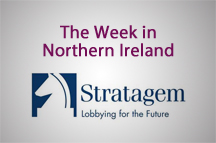 Not for the first time in its tumultuous history, Northern Ireland’s political agenda was this week dominated by the spectre of paramilitarism.
Not for the first time in its tumultuous history, Northern Ireland’s political agenda was this week dominated by the spectre of paramilitarism.
The subject has set the tone since late summer, when Stormont’s power-sharing institutions were plunged into a fresh crisis following assertions by PSNI Chief Constable George Hamilton that active members of an equally active Provisional IRA were involved in the August murder of Kevin McGuigan, a senior republican, outside his east Belfast home. The group, he said, was not involved in active terrorist activity, however.
In spite of that carefully crafted statement, unionism felt compelled to act. The UUP withdrew its sole representative from the Executive; the DUP initiated a six-week period of rolling ministerial appointments and immediate resignations. “Business as usual” would not proceed, said First Minister Peter Robinson MLA.
This week, an official assessment of paramilitary activity in Northern Ireland - the Westminster government’s hastily empanelled response to the incident’s fallout - was presented to Parliament by Secretary of State Theresa Villiers MP. In her Commons address Ms Villiers said the assessment showed the PIRA's ruling body, the 'army council', continues to operate in some guise, it retains a "wholly political focus" and a commitment to peace. A police and MI5 assessment showed that the PIRA "is not involved in targeting or conducting terrorist attacks against the state".
 With respect to the loyalist equivalents, Ms Villiers’s assertion that certain members, including senior figures, were engaged in criminality is not surprising.
With respect to the loyalist equivalents, Ms Villiers’s assertion that certain members, including senior figures, were engaged in criminality is not surprising.
Surely one of the most interest findings was that PIRA members “believe” the ruling body oversees both the proscribed organisation and Sinn Féin itself.
Given that the Secretary of State had linked an Executive party to a present iteration of the PIRA - though the historical links between the two have never been denied in any quarter - the unionist response concentrated on a return to work.
Mr Robinson immediately signalled the DUP ministers’ return to their official roles. While he was quick to suggest that the dismantlement of paramilitary structures remained a priority, the pressure stemming from largely vacant ministerial posts - the health department in particular - will not have been an insignificant factor in the First Minister’s willingness to end his party’s recent approach to governance.
 UUP leader Mike Nesbitt MLA, meanwhile, claimed vindication for the decision taken at the start of September to surrender the Regional Development ministry. Now occupying a quasi-oppositional role, Mr Nesbitt and the UUP can be expected at their forthcoming party conference to state that their actions, rather than those of the rival DUP, moulded the current reality.
UUP leader Mike Nesbitt MLA, meanwhile, claimed vindication for the decision taken at the start of September to surrender the Regional Development ministry. Now occupying a quasi-oppositional role, Mr Nesbitt and the UUP can be expected at their forthcoming party conference to state that their actions, rather than those of the rival DUP, moulded the current reality.
The end point of the whole exercise is still unclear. The independent assessment essentially matches the Chief Constable’s original comments, comments which were, in turn, echoed by Ms Villiers in August.
With Sinn Féin bullish in the wake of the report, and deputy First Minister Martin McGuinness MLA maintaining that the party answers only to itself, neither they nor their unionist rivals will be willing to blink first as negotiations begin once more on the summer’s original, but potentially more destructive dispute, namely the introduction of Conservative welfare reforms.
Sinn Féin has loudly opposed austerity measures in the Republic of Ireland. To accept their implementation north of the border will require a degree of compromise recently absent.
Whether “business as usual” in the DUP retaking their Executive seats translates into dramatic breakthrough in the final weeks of the multi-party talks is anyone’s guess at this stage – but the first glimpses of carefully choreographed statements, and a softening of the rhetoric between DUP and Sinn Féin were evident to the trained eye in the week that was.












